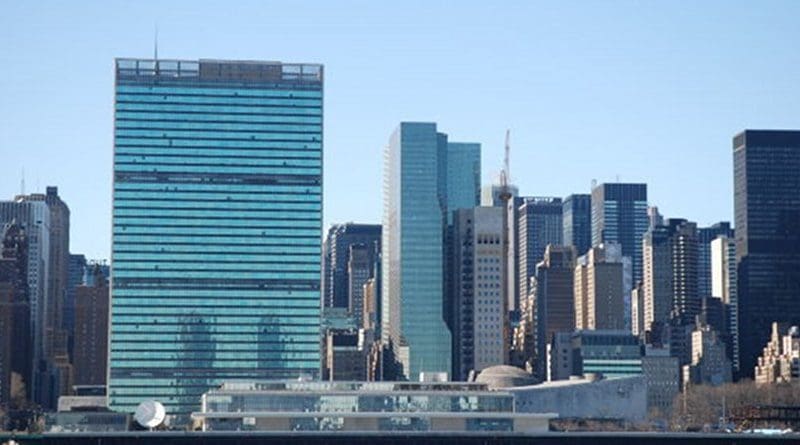UN And Washington DC: A Tale Of Two Inaugurations – OpEd
Next month, leadership will change hands at both the United Nations and the White House and the contrasts could not be any sharper.
The new UN Secretary General, Antonio Guterres, is a Democratic Socialist who has an impeccable record as the former head of the UN’s refugee agency and, before that, a parliamentarian and head of a state (Portugal), deeply committed to international law and the principles of global governance.
The new US president, Donald Trump, is an ultra-nationalist, xenophobic wealthy businessman who has picked a cabinet of billionaires and Wall Street insiders while giving lip service to the working Americans.
The two men clearly stand on the opposite of the political spectrum, in light of Trump’s incessant attacks on “global government” and globalization.
Still, this does not mean that Trump and Guterres have no common grounds and, in fact, Trump may soon find out that in his designs for a new, and more cooperative, Russia policy he has an ally with the new UN chief, who also favors West’s reduction of tensions with Russia. This harmony of positions can be facilitated by Trump’s choice of India-born Niki Haley as the next US ambassador to UN, assuming that Haley will not repeat her immediate predecessor’s outrageous antics. Indeed, Samantha Power has turned out to be a liability for US’s global prestige with her countless spoiled behavior, reminding us of the Marlon Brando movie, The Ugly American.
The problem, however, is that Mr. Trump has no real understanding of world affairs and is perhaps clueless about UN’s contributions to world peace and stability. He definitely needs a quick education on the UN, in order to bracket his and his key advisers’ attacks on UN, which has been echoed by some members of US Congress, not to mention a whole array of other right wing politicians and pundits, some of whom even call for US’s exit from the UN and or stop financing it.
The anti-UN sentiment will likely be moderated somewhat by the incoming secretary of state, Rex Tillerson, whose global experience as the head of Exxon Mobil will likely prove crucial in bringing a modicum of equilibrium and rationality to the Trump administration. Hopefully, Trump will change his mind about choosing the ultra-right warmonger John Bolton as the number 2 man at the Department of State, and it is difficult to imagine that Tillerson could actually work with a nut-case like Bolton.
For his part, Mr. Guterres will likely emphasize policy continuity and introduce incremental changes, such as streamlining the bureaucratic decision-making at the UN and making it more efficient, while prioritizing UN’s traditional agenda with respect to peacemaking, peacebuilding, humanitarian assistance, development, climate, gender equality, and so on. The UN is a big organization constantly in a state of financial scarcity, which in turn requires creative methods for alternative UN financing. Trump the businessman can perhaps lend a hand to the UN in this regard, so that the UN can function more independently.
This aside, there are many issues which can pit the US and UN at odds with each other in the coming months and years, such as the Israel-Palestine issue, in light of Trump’s choice of a pro-settlement ambassador to Israel. If Trump chooses to go against the idea of a Palestinian state, then the other UN member states will revolt against it, thus setting a showdown at the UN, which has been a bulwark of pro-Palestinian rights. Weakening the UN and strengthening the Israeli hands in its expansionism may go hand in hand in the ‘new Washington’. There are, of course, a whole set of other issues, such as the Iran nuclear accord, endorsed by the UN Security Council, which might become another flashing point at the UN if Trump opts out of the accord.
In a new era of protectionism and rising nationalism, the global environment for the UN is rapidly moving in the opposite direction of what the UN stands for, which is unfortunate and one certainly hopes that the UN’s new leader will prove effective in cultivating the UN’s global culture of peace.
In a worst case scenario, recalling US’ pretextual war on Iraq, should Trump try to ignite another war in the Middle East or elsewhere, how the UN responds to such a scenario is very important. In the past, the UN heads have bowed before the mighty US’ influence, often making a mockery of their role and responsibility, such as Kofi Annan’s lame objections to the war on Iraq, which he personally benefited through the scandalous food for oil program, and, yet, it is highly unlikely that Guterres will behave that way. Rather, it is almost a sure bet that Guterres will put up a heroic fight against any new US or Western shenanigan to spark the fires of yet another calamitous war. In other words, Trump and Guterres may be destined to openly clash with each other, again in a worst case scenario that, unfortunately, is not too remote from reality.


Thank you Dr. Afrasiabi for yet another illuminating article.